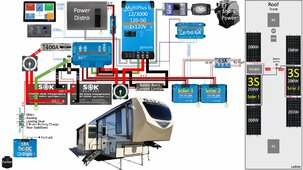drumguy
New Member
Hi, I am building a system to power a camper trailer and am drowning in info. I appreciate any help from wiser folks. Bought 2 X SOK LIP 12V 206AH Batteries a couple years ago and now have some more money and need to get rolling on this. I have a Honda EU2200i generator and would like to next add an inverter/charger so that I can begin using the storage capacity now to power 120VAC and 12VDC loads in the camper. I intend to add PV panels in the future. Loads are a Dometic cooler (around 130W future purchase), various device charging, TV (around 100W), various lighting (will update to LED), Microwave (1500W), Blender (1700W), also wouldn't mind running an A/C unit that is installed in the camper (I'll have to get over there and see what it draws).
I started looking at Victron because I gleaned that they are quality and user friendly. But, it seems like I won't be able to use 110Vac generator to charge batteries (input voltage is 187V to 265V). I had intended to go 12V system to simplify (existing 12vdc and 120vac loads in camper), but now second guessing. So:
Should I be looking at 24V System with my two SOKs in series or stay with 12V?
Is there going to be a good way to use my generator to charge these batteries until I acquire pv?
Is there a good unit that will charge batteries, provide 120VAC sine wave power and have MPPT for adding panels later?
I don't mind spending money wisely but I'm gonna need help and have to do it in chunks.
Thanks.
I started looking at Victron because I gleaned that they are quality and user friendly. But, it seems like I won't be able to use 110Vac generator to charge batteries (input voltage is 187V to 265V). I had intended to go 12V system to simplify (existing 12vdc and 120vac loads in camper), but now second guessing. So:
Should I be looking at 24V System with my two SOKs in series or stay with 12V?
Is there going to be a good way to use my generator to charge these batteries until I acquire pv?
Is there a good unit that will charge batteries, provide 120VAC sine wave power and have MPPT for adding panels later?
I don't mind spending money wisely but I'm gonna need help and have to do it in chunks.
Thanks.
Last edited:




